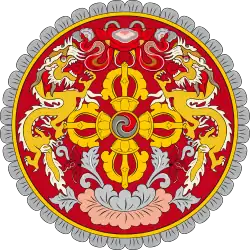Mass media in Bhutan
The various mass media in Bhutan have historically been government-controlled, although this has changed in recent years. The country has its own newspapers, television and radio broadcasters and Internet Service Providers.
| Part of a series on the |
| Culture of Bhutan |
|---|
 |
| History |
| People |
| Languages |
| Cuisine |
| Religion |
| Art |
| Sport |
Journalism
Kuensel, a newspaper of a government-owned corporation, circulates six days a week in Dzongkha and English. In 2006 two privately-owned, independent newspapers were launched as part of preparation for the country's move to democracy: Bhutan Times, and Bhutan Observer, which also produced a Dzongkha edition. Bhutan Today, an English daily newspaper launched in October 2008. The Journalist established in 2009 is a privately owned weekly English Language newspaper published on Sundays.[1] In late September 2009, the first Financial Newspaper of Bhutan was launched with the name Business Bhutan.
According to Freedom House, private newspapers in Bhutan face "financial fragility" and rely on government advertisements for approximately 80 percent of their income. Since private media outlets were made legal in 2006, the number of private media outlets has grown, reducing the access of each outlet to that revenue. In 2012, a financial crisis occurred and the government chose to only run advertisements for the then-upcoming 2013 elections on state media outlets. Due to their financial condition, newspapers cut their staff, and some implemented additional cost-cutting measures such as switching from publishing daily to publishing bi-weekly and temporarily ceasing to produce a print edition. The government was accused of intentionally reducing advertising revenue to retaliate against The Bhutanese's reporting on governmental corruption.[2][3]
In 2008 the Bhutan Centre for Media and Democracy was launched to "nurture democracy in Bhutan through civic engagement, public discourse and media literate citizens".[4]
Radio and television
The Bhutan Broadcasting Service was established in 1973 as a radio service, broadcasting in short wave nationally, and on the FM band in Thimphu. The service started television broadcasts in 1999, making Bhutan the last country in the world to introduce television. As part of the King's modernization program, cable television was introduced shortly after. By 2002, however, the crime rate had increased appreciably, and the introduction of cable television is alleged to be responsible for the spurt in crime.The Bhutan Broadcasting Service (BBS) has been expanded and will be available Bhutan and will also be available in the region. The signal can be received in almost 40 other countries from Turkey to Indonesia. The Bhutan Broadcasting Service has now assumed the role of a true national broadcaster said by the minister of information and communications. In 2008 the adoption of the constitution by Lyonpo Leki Dorji meant that the BBS would now be taking on a more pivotal in educating the public. When they took the role to educate the public this meant they had to improve the quality of news and programs because it became imperative. Sudhir Vyas, ambassador of Bhutan, thinks India is privileged to be associated with the development of media in Bhutan. The launch was a true testimony and the support the government had for the media.text This symbolized the role that the government played in the development of Bhutan. The Bhutan Broadcasting Service has also been said to be the cheapest and easiest way to educate people.[5]
Electronic media
The government issued an order to DoT MoC in April 1999 to make internet working until June 2, 1999, giving them three months to get done.[6] Bhutan has about 295,000 Internet users, 25,200 landline subscribers, and 676,000 mobile phone subscribers.[7] Bhutan's only Internet service provider is Druknet which is owned by Bhutan Telecom. The mobile subscriber in 2014 was at 14%. As the market began to mature in 2015 it was 5% and 2% in 2015 and 2016, as market penetration reached 88% in 2016. It has been predicted in the next five years or so there will be a moderate growth. Over this time the mobile subscriber has reached an excessive of 100% at times. Internet access in the country has had a major boost by mobile networks, largely by EDGE/GPRS and the new 3G technology platforms. Even though this is the case now because they have been isolated from the rest of the world for a long time until the 1990s. The fixed telephone lines are declining in Bhutan from a small base as the mobile segment keeps expanding. Penetrations have dropped over the years as in 2014 dropped to 3.1%, 2015 dropped to 2.9%, and 2016 dropped to 2.7%. Internet in Bhutan developed down a slow path during the beginning of the internet because the country embraced the internet cautiously which is still continuing to be low because the country is struggling economically. Fixed broadband penetration is increasing from a small base as it has continued over the past few years. Penetration has increased by 2.3% in 2012, 3.1% in 2014, 4% in 2016, and is predicted to grow in the next five years until 2021.[8]
Film
"Gasa Lamai Singye" was the first film movie made by Ugyen Wangdi the founder of the Country's fledgling cinema in 1989. The Bhutanese lama Dzongsar Jamyang Khyentse Rinpoche is a well-known filmmaker, who produced and directed The Cup and Travellers and Magicians. While The Cup was shot in a Tibetan monastery in northern India, Travellers and Magicians was the first feature film to be filmed entirely in Bhutan, with a cast consisting entirely of Bhutanese people. No professional actors were used in either film. Historically, films in Bhutan were often adaptations of Bollywood films however in recent years film makers are aiming at defining Bhutanese cinema, nevertheless influence from Bollywood is still a major inspiration.[9] More recently the popularity of Korean dramas have also had some effect on Bhutanese cinema.[10]
References
- "The Journalist". Bhutan Media Foundation. Retrieved 26 March 2020.
- Arora, Vishral (20 October 2013). "Unhappy Journalists in 'Happy' Bhutan". The Wall Street Journal. Retrieved 5 May 2018.
- "Bhutan". Freedom House. Retrieved 5 May 2018.
- "BCMD". BCMD. Retrieved 29 April 2020.
- Bhutan broadcasting service launches nationwide TV. (2006, Feb 20). BBC Monitoring South Asia Retrieved from http://search.proquest.com/docview/459899115
- Thinley, Jichen. "History of the Internet." The Internet for Surgeons (n.d.): 5-9. http://nog.bt/btnog1/presentations/history-keynote.pdf. 17 November 2004. Web. <http://nog.bt/btnog1/presentations/history-keynote.pdf>.
- "The World Factbook — Central Intelligence Agency". CIA.gov.
- "Bhutan Telecoms Mobile and Broadband".
- Stancati, Margherita. "Does Bhutan Love Bollywood Too Much?".
- "The Raven".
